There lived in our abode a nice lieut.
He moved, and now we’re seeking a nieut.
— Albert Wilansky, in Word Ways, November 1973
There lived in our abode a nice lieut.
He moved, and now we’re seeking a nieut.
— Albert Wilansky, in Word Ways, November 1973
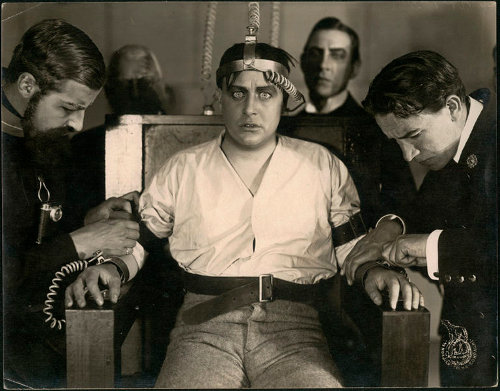
Last words of executed criminals:
Before his lethal injection in 2007, Arizona murderer Robert Comer said, “Go Raiders.”
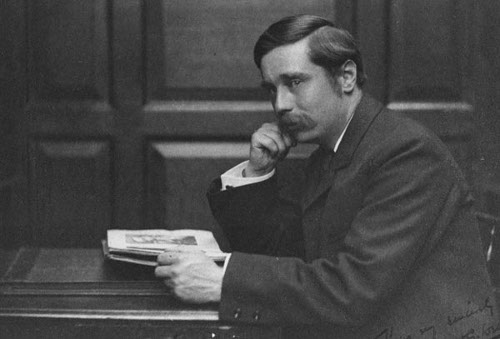
Mr. H.G. Wells
Was composed of cells.
He thought the human race
Was a perfect disgrace.
So wrote Edmund Clerihew Bentley in demonstrating the whimsical biographical verse that he invented. “I never heard who started the practice of referring to this literary form — if that is the word — as a Clerihew,” he wrote, “but it began early, and the name stuck.”
That’s as it should be: In a 1981 collection, Gavin Ewart wrote, “Nobody much except Bentley has ever written really good clerihews.” Samples:
“The moustache of Adolf Hitler
Could hardly be littler,”
Was the thought that kept recurring
To Field-Marshal Goering.
It is curious that Handel
Should always have used a candle.
Men of his stamp
Generally use a lamp.
Although Machiavelli
Was extremely fond of jelly,
He stuck religiously to mince
While he was writing The Prince.
The meaning of the poet Gay
Was always as clear as day,
While that of the poet Blake
Was often practically opaque.
A man in the position
Of the emperor Domitian
Ought to have thought twice
About being a Monster of Vice.
Edgar Allan Poe
Was passionately fond of roe.
He always like to chew some
When writing anything gruesome.
The great Duke of Wellington
Reduced himself to a skellington.
He reached seven stone two,
And then — Waterloo!
John Knox was a man of wondrous might,
And his words ran high and shrill,
For bold and stout was his spirit bright,
And strong was his stalwart will.
Kings sought in vain his mind to chain,
And that giant brain to control,
But naught on plain or stormy main
Could daunt that mighty soul.
John would sit and sigh till morning cold
Its shining lamps put out,
For thoughts untold on his mind lay hold,
And brought but pain and doubt.
But light at last on his soul was cast,
Away sank pain and sorrow,
His soul is gay, in a fair to-day,
And looks for a bright to-morrow.
— “Unidentified,” in Current Opinion, July 1888
In the November 1971 issue of Word Ways, reader Solomon Golomb noted that the following placard appeared in the window of a business establishment “and was considered quite ordinary by all passers-by.” Why?
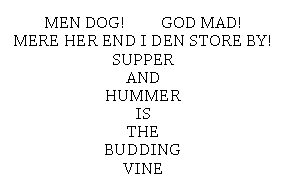
A self-descriptive sentence by Howard Bergerson:
In this sentence, the word and occurs twice, the word eight occurs twice, the word four occurs twice, the word fourteen occurs four times, the word in occurs twice, the word occurs occurs fourteen times, the word sentence occurs twice, the word seven occurs twice, the word the occurs fourteen times, the word this occurs twice, the word times occurs seven times, the word twice occurs eight times, and the word word occurs fourteen times.
Look before you leap.
He who hesitates is lost.
Absence makes the heart grow fonder.
Out of sight, out of mind.
You’re never too old to learn.
You can’t teach an old dog new tricks.
A word to the wise is sufficient.
Talk is cheap.
Fools rush in where angels fear to tread.
Nothing ventured, nothing gained.
Actions speak louder than words.
The pen is mightier than the sword.
Many hands make light work.
Too many cooks spoil the broth.
Seek and ye shall find.
Curiosity killed the cat.
Don’t look a gift horse in the mouth.
Beware of Greeks bearing gifts.
The best things in life are free.
There’s no such thing as a free lunch.
G.K. Chesterton said, “I owe my success to having listened respectfully to the very best advice, and then going away and doing the exact opposite.”
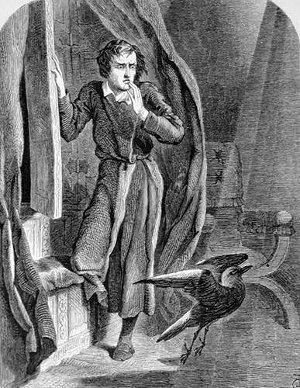
Florida bankruptcy judge A. Jay Cristol had moved to dismiss a case in 1986 when he reconsidered, inspired by “a little old ebony bird.” He filed this explanation:
Once upon a midnight dreary,
While I pondered weak and weary
Over many quaint and curious files of chapter seven lore
While I nodded nearly napping, suddenly there came a tapping
As of some one gently rapping, rapping at my chamber door,
“‘Tis some debtor,” I muttered, “tapping at my chamber door–
Only this and nothing more.”
Ah distinctly I recall, it was in the early fall
And the file still was small
The Code provided I could use it
If someone tried to substantially abuse it
No party asked that it be heard.
“Sua sponte” whispered a small black bird.
The bird himself, my only maven,
Strongly looked to be a raven.
Upon the words the bird had uttered
I gazed at all the files cluttered
“Sua sponte,” I recall, had no meaning; none at all.
And the cluttered files sprawl, drove a thought into my brain.
Eagerly I wished the morrow–vainly I had sought to borrow
From BAFJA, surcease of sorrow–and an order quick and plain
That this case would not remain as a source of further pain.
The procedure, it seemed plain.
As the case grew older, I perceived I must be bolder.
And must sua sponte act, to determine every fact,
If primarily consumer debts, are faced,
Perhaps this case is wrongly placed.
This is a thought that I must face, perhaps I should dismiss this case.
I moved sua sponte to dismiss it for I knew I would not miss it.
The Code said I could, I knew it.
But not exactly how to do it, or perhaps some day I’d rue it.
I leaped up and struck my gavel.
For the mystery to unravel
Could I? Should I? Sua sponte, grant my motion to dismiss?
While it seemed the thing to do, suddenly I thought of this.
Looking, looking towards the future and to what there was to see
If my motion, it was granted and an appeal came to be,
Who would be the appellee? Surely, it would not be me.
Who would file, but pray tell me, a learned brief for the appellee
The District Judge would not do so
At least this much I do know.
Tell me raven, how to go.
As I with the ruling wrestled
In the statute I saw nestled
A presumption with a flavor clearly in the debtor’s favor.
No evidence had I taken
Sua sponte appeared foresaken.
Now my motion caused me terror
A dismissal would be error.
Upon consideration of § 707(b), in anguish, loud I cried
The court’s sua sponte motion to dismiss under § 707(b) is denied.
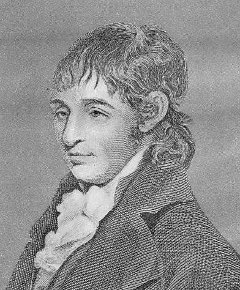
English scholar Richard Porson (1759-1808) may have had the most prodigious memory of the 18th century. “He knew almost the whole of Homer, Horace, Cicero, Virgil and Livy,” recounts Henry H. Fuller in The Art of Memory (1898). “He could repeat whole plays from Shakespeare and complete books from Paradise Lost, scenes from Foote, and scores of pages from Gibbon’s Decline and Fall, or Rapin’s works. He knew by heart the whole of Mortal Tale of the Dean of Badajos, and Edgeworth’s Essays on Irish Bulls, and could repeat from beginning to end Smollett’s Roderick Random and other noted English novels. He could recite a newspaper page after one reading, and said that he would undertake to repeat the entire contents of a week’s issues of the London Morning Chronicle.”
Eliezer Cogan recalls that one day Porson called on a friend who asked him the meaning of a word in Thucydides. Without looking at the book, Porson repeated the passage. His friend asked how he knew which passage he’d been reading. “Because,” Porson replied, “the word occurs only twice in Thucydides, once on the right-hand page in the edition which are using, and once on the left. I observed on which side you looked, and accordingly knew to which passage you referred.”